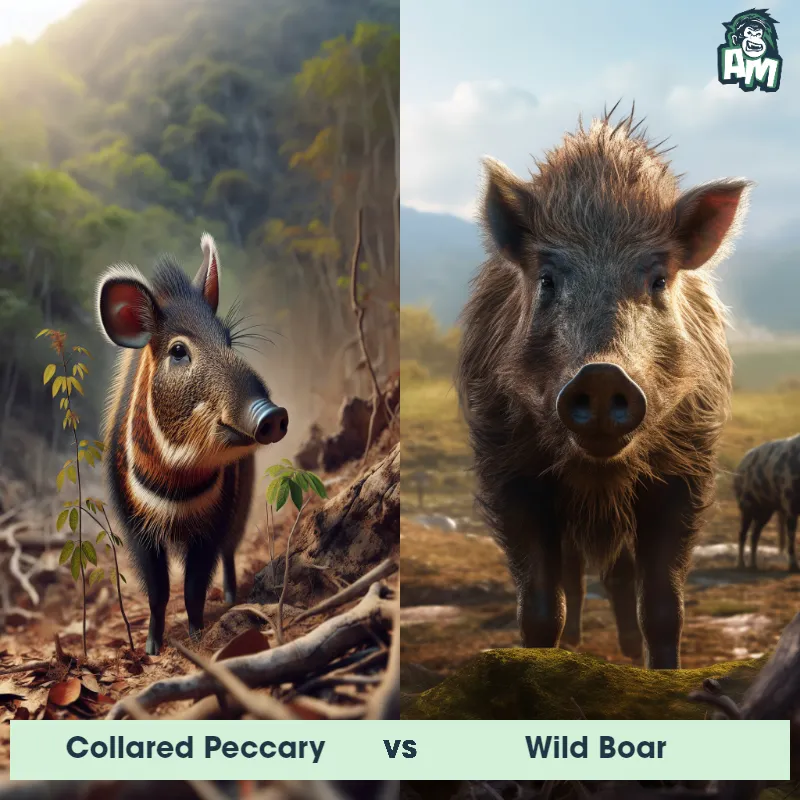The Collared Peccary
The Collared Peccary, also known as the Javelina, is a medium-sized mammal native to the Americas. They have a distinct appearance with a stocky build, short legs, and a pig-like snout. Their coat is coarse and bristly, typically gray or black in color with a white collar marking around their neck. Collared Peccaries are highly social animals and live in small groups called sounders. They are primarily herbivores, feeding on a variety of plants, fruits, and roots.

| Collared Peccary | |
|---|---|
| Size | 2-3 feet (61-91 cm) tall at the shoulder |
| Weight | 35-60 pounds (16-27 kilograms) |
| Speed | 15 mph (24 km/h) |
| Key Strength | Strong bite and tusks |
| Biggest Weakness | Can be easily overwhelmed by larger predators |
| Scientific Name | Pecari tajacu |
| Family | Tayassuidae |
| Habitat | Grasslands, deserts, and forests |
| Geography | Found in North, Central, and South America |
| Diet | Omnivorous, mainly feed on fruits, roots, and small animals |
| Lifespan | 10 years - 15 years |

The Collared Peccary
The Collared Peccary, also known as the Javelina, is a medium-sized mammal native to the Americas. They have a distinct appearance with a stocky build, short legs, and a pig-like snout. Their coat is coarse and bristly, typically gray or black in color with a white collar marking around their neck. Collared Peccaries are highly social animals and live in small groups called sounders. They are primarily herbivores, feeding on a variety of plants, fruits, and roots.
Fun Fact: Collared Peccaries communicate using a variety of vocalizations, including barks, growls, and grunts, which they use to warn off intruders and maintain contact with other members of their group.
| Collared Peccary | |
|---|---|
| Size | 2-3 feet (61-91 cm) tall at the shoulder |
| Weight | 35-60 pounds (16-27 kilograms) |
| Speed | 15 mph (24 km/h) |
| Key Strength | Strong bite and tusks |
| Biggest Weakness | Can be easily overwhelmed by larger predators |
| Scientific Name | Pecari tajacu |
| Family | Tayassuidae |
| Habitat | Grasslands, deserts, and forests |
| Geography | Found in North, Central, and South America |
| Diet | Omnivorous, mainly feed on fruits, roots, and small animals |
| Lifespan | 10 years - 15 years |
Collared Peccary Matchups
We use AI to simulate matchups between the Collared Peccary and other animals. Our simulation considers size, strength, and natural predatory behaviors to determine the most likely outcome.

Can't find the Matchup you want?
Create Your Own MatchupCollared Peccary: Diet, Predators, Aggression, and Defensive Behaviors
What do Collared Peccaries eat?
Collared Peccaries primarily eat a variety of plant-based foods such as fruits, roots, tubers, and nuts. Collared Peccary have also been known to consume insects, small animals, and even carrion when necessary.
Do Collared Peccaries have any predators?
Yes, Collared Peccaries have several natural predators in the wild, including mountain lions, jaguars, coyotes, bobcats, and large birds of prey. However, their sharp tusks and group defense tactics can make them formidable opponents for these predators.
Are Collared Peccaries aggressive?
Collared Peccaries can be aggressive, especially when Collared Peccary feel threatened or cornered. Collared Peccary have a strong pack mentality and will defend themselves and their territory against perceived threats. However, Collared Peccary are generally not aggressive towards humans unless provoked.
Do Collared Peccaries fight?
Collared Peccaries are known to engage in fights, especially within their own groups or with rival peccary groups. These fights can involve pushing, biting, and aggression, particularly during mating season or when defending territory.
How do Collared Peccaries defend themselves?
Collared Peccaries defend themselves using their long, sharp tusks, which can cause serious injuries to predators or rival peccaries. Collared Peccary also rely on their strong pack mentality and numbers to deter attacks and defend their territory.
What is the biggest weakness of Collared Peccaries in a fight?
Despite their sharp tusks and pack defense tactics, Collared Peccaries can be vulnerable to larger predators such as mountain lions or jaguars. Their small size and lack of speed compared to these predators make them especially vulnerable when facing such formidable foes.
Fun Fact: Despite their pig-like appearance, Collared Peccaries are not closely related to pigs. They are actually part of a different family of mammals called Tayassuidae, which includes other species of peccaries found in Central and South America.
Fun Fact: When threatened or cornered, Collared Peccaries can be quite aggressive and will defend themselves using their long, sharp canine teeth. However, they are generally non-aggressive towards humans and will usually prefer to retreat rather than attack.











